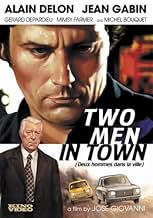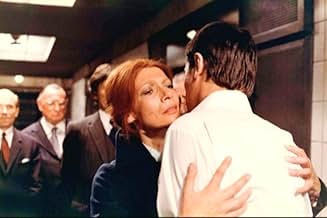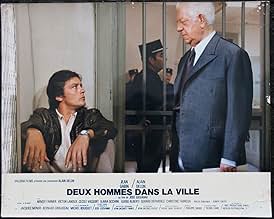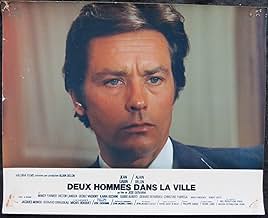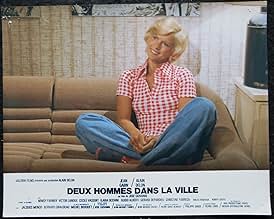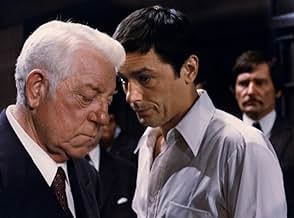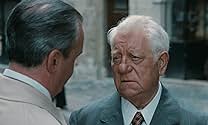AVALIAÇÃO DA IMDb
7,3/10
5,7 mil
SUA AVALIAÇÃO
Um ex-ladrão de banco é libertado após 10 anos de prisão. Ele recebe ajuda de um assistente social, mas é perseguido por um velho policial de seu passado.Um ex-ladrão de banco é libertado após 10 anos de prisão. Ele recebe ajuda de um assistente social, mas é perseguido por um velho policial de seu passado.Um ex-ladrão de banco é libertado após 10 anos de prisão. Ele recebe ajuda de um assistente social, mas é perseguido por um velho policial de seu passado.
- Direção
- Roteiristas
- Artistas
Malka Ribowska
- L'avocate de Gino
- (as Malka Ribovska)
Avaliações em destaque
Curiously enough, the central plot of this one is quite similar to that of ONCE A THIEF (1965; also starring Alain Delon and which I watched on the very same day) though here it's even gloomier (ultimately taking the form of a plea against capital punishment)! Incidentally, co-writer/director Giovanni had been a convict in real-life, and even wrote the novel which inspired Jacques Becker's marvelous prison-escape drama LE TROU (1960).
Anyway, Delon and Jean Gabin are well-teamed here (this was the last of three films in which they appeared together, following ANY NUMBER CAN WIN [1963] and THE SICILIAN CLAN [1969]): the latter isn't particularly exerted by his role being, after all, among his last but the former is unusually committed and, in fact, he also served as the film's producer! Mimsy Farmer appears as Delon's new lover following the tragic death of his wife in a road accident; Michel Bouquet is memorable as the Javert-like police inspector who won't let Delon go (a slinky but nastier version of the Van Heflin part in ONCE A THIEF); Gerard Depardieu has a brief role at the beginning as a wannabe criminal associate of Delon's.
Anyway, Delon and Jean Gabin are well-teamed here (this was the last of three films in which they appeared together, following ANY NUMBER CAN WIN [1963] and THE SICILIAN CLAN [1969]): the latter isn't particularly exerted by his role being, after all, among his last but the former is unusually committed and, in fact, he also served as the film's producer! Mimsy Farmer appears as Delon's new lover following the tragic death of his wife in a road accident; Michel Bouquet is memorable as the Javert-like police inspector who won't let Delon go (a slinky but nastier version of the Van Heflin part in ONCE A THIEF); Gerard Depardieu has a brief role at the beginning as a wannabe criminal associate of Delon's.
I never cried watching Alain Delon's film before, but this one is an exception.
However, despite the differences between Alain Delon and Jean Gabin, their acting styles share melancholy and barely repressed violence. In Two Men in Town (1973), the final of their collaborations together, the stars share enough iconic chemistry for their scenes to reflect the intergenerational passing of a torch.
This is such a touching film. It's so sad when I see the ratings and review while this film should be more have recognition.
Good job, Alain! Also my crush.
However, despite the differences between Alain Delon and Jean Gabin, their acting styles share melancholy and barely repressed violence. In Two Men in Town (1973), the final of their collaborations together, the stars share enough iconic chemistry for their scenes to reflect the intergenerational passing of a torch.
This is such a touching film. It's so sad when I see the ratings and review while this film should be more have recognition.
Good job, Alain! Also my crush.
It represents the ash after its final credits. last meet between Gabin and Delon on screen, it is a film inspiring, for an old man like me, nostalgia. because it seems a puzzle with familiar pieces. simple. but seductive. dramatic. for the nuances. a story about second chance, justice and sins. one of films for a precise target. because it is one of keys to an universe of cinema who seems, for many reasons, lost today.
This is an interesting film in structure, as the main conflict doesn't even present itself until almost 40 minutes into the film. Up until then, it's a very nice story about an ex-con (Alain Delon) and his good friend--a social worker who befriended him in prison and has worked to help rehabilitate him (Jean Gabin). However, even though Delon is doing a great job on his parole (even after tragedy strikes)and is living an honest life, an old cop who arrested him a decade earlier has decided that it's his mission to PROVE that Delon didn't change and is just another con waiting to show his true colors! And so, doggedly, the cop seems determined to push Delon until he forces his to turn bad.
While the parallels are not perfect and the setting has been updated to modern France, this sure seemed like a reworking of the classic Victor Hugo story "Les Misérables". Like the leading man from the novel, Jean Valjean, Delon's character has changed after leaving prison and is committed to doing right. And, like Javert, the cop who suddenly enters his life will stop at nothing to prove that a man like Delon CAN'T change despite all appearances to the contrary. So, the cop harasses the man's employer, his girlfriend...any one and everyone. He brings Delon in for interrogations and pushes the man unmercifully--so much so that you assume sooner or later Delon will snap. What happens next is a bit of a shock--and makes for an exciting finale and a very compelling film.
It's interesting, by the way, that the bad cop is not the only thing in the system that conspires to keep criminals criminals. Other than Gabin, the rest of the prison officials in the film seem like reactionaries--who unintentionally perpetuate the problems through their stupidity. While this is somewhat of an over-simplification, I like this angle, as prison officials often do make the problems worse (I used to work with the prison system like Gabin's character and was amazed at how corrupt or dumb some of these men were--including come guards who were simply sadists). It's a novel approach (aside from the Hugo novel) and made the film quite compelling. Plus, it humanized Delon so much that you hurt for him and really were rooting for him throughout the film.
While the parallels are not perfect and the setting has been updated to modern France, this sure seemed like a reworking of the classic Victor Hugo story "Les Misérables". Like the leading man from the novel, Jean Valjean, Delon's character has changed after leaving prison and is committed to doing right. And, like Javert, the cop who suddenly enters his life will stop at nothing to prove that a man like Delon CAN'T change despite all appearances to the contrary. So, the cop harasses the man's employer, his girlfriend...any one and everyone. He brings Delon in for interrogations and pushes the man unmercifully--so much so that you assume sooner or later Delon will snap. What happens next is a bit of a shock--and makes for an exciting finale and a very compelling film.
It's interesting, by the way, that the bad cop is not the only thing in the system that conspires to keep criminals criminals. Other than Gabin, the rest of the prison officials in the film seem like reactionaries--who unintentionally perpetuate the problems through their stupidity. While this is somewhat of an over-simplification, I like this angle, as prison officials often do make the problems worse (I used to work with the prison system like Gabin's character and was amazed at how corrupt or dumb some of these men were--including come guards who were simply sadists). It's a novel approach (aside from the Hugo novel) and made the film quite compelling. Plus, it humanized Delon so much that you hurt for him and really were rooting for him throughout the film.
Directed and written by Corsican José Giovanni, produced by Alain Delon, who stars in the film in partnership with veteran Jean Gabin, this is certainly a different film from the French-Italian cop movies of the 60s and 70s, many of them with the same protagonists.
Here we have a regenerated ex-convict struggling to integrate into society and a police and judicial system that cannot forgive and reintegrate those who have already paid for their mistakes and truly want to turn a page in their lives.
A film that exposes the weaknesses of the French penal and judicial system while condemning the maintenance of the death penalty in modern France in 1973.
Here we have a regenerated ex-convict struggling to integrate into society and a police and judicial system that cannot forgive and reintegrate those who have already paid for their mistakes and truly want to turn a page in their lives.
A film that exposes the weaknesses of the French penal and judicial system while condemning the maintenance of the death penalty in modern France in 1973.
Você sabia?
- CuriosidadesThis movie was part of a campaign against death penalty in France that took place in the 1970's. Director José Giovanni was sentenced to death in 1945 right after the war and was pardoned by the then French president. Ten years later, after completing his sentence he became a writer, screenwriter and movie director. Death penalty was finally abolished in France in 1981.
- ConexõesFeatured in Adam & Yves (1974)
Principais escolhas
Faça login para avaliar e ver a lista de recomendações personalizadas
- How long is Two Men in Town?Fornecido pela Alexa
Detalhes
- Tempo de duração1 hora 40 minutos
- Mixagem de som
- Proporção
- 1.66 : 1
Contribua para esta página
Sugerir uma alteração ou adicionar conteúdo ausente

Principal brecha
By what name was Dois Homens Contra uma Cidade (1973) officially released in India in English?
Responda


